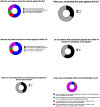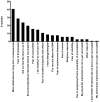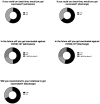COVID-19 Disease and Vaccination: Knowledge, Fears, Perceptions and Feelings of Regret for Not Having Been Vaccinated among Hospitalized Greek Patients Suffering SARS-CoV-2 Infection
- PMID: 36005265
- PMCID: PMC9408697
- DOI: 10.3390/idr14040063
COVID-19 Disease and Vaccination: Knowledge, Fears, Perceptions and Feelings of Regret for Not Having Been Vaccinated among Hospitalized Greek Patients Suffering SARS-CoV-2 Infection
Abstract
Background: The development of vaccines against COVID-19 has greatly altered the natural course of this infection, reducing the disease's severity and patients' hospitalization. However, hesitancy against vaccination remains an obstacle in the attempt to achieve appropriate herd immunity that could reduce the spread of SARS-CoV-2. The aim of this study was to investigate the perceptions and attitudes of COVID-19 patients hospitalized during the fourth pandemic wave in two Greek hospitals and assess whether their experience had changed their intentions regarding vaccination against COVID-19.
Methods: This is a cross-sectional, questionnaire-based survey, conducted from 31 August 2021 to 18 February 2022 in the COVID-19 departments of two tertiary care hospitals. The questionnaire included questions regarding the patients' educational level, knowledge and beliefs regarding SARS-CoV-2, personal protection measures, beliefs regarding vaccination, vaccination status, reasons for not been vaccinated against SARS-CoV-2, feelings of regret for not been vaccinated, and willingness to be vaccinated in the future. All adult patients with COVID-19 were eligible, regardless of their vaccination status against SARS-CoV-2.
Results: In total, 162 patients agreed and participated in the study, with 97% of them suffering severe COVID-19. Their median age was 56 years, and 59.9% (97 patients) were male. Among them, 43.8% had been vaccinated against COVID-19. When unvaccinated patients were asked the reasons for not being vaccinated, the most frequent responses were that they were waiting for more scientific data, due to uncertainty about long-term consequences of the vaccine, and their fear of thrombosis. When at discharge, unvaccinated hospitalized COVID-19 patients were asked whether they would get vaccinated if they could turn time back, and 64.7% of them replied positively.
Conclusions: The study reveals several patients' fears and misconceptions and suggests that there is room for implementing measures that could reduce knowledge gaps allowing for improvement of vaccination rates against COVID-19.
Keywords: COVID-19; SARS-CoV-2; perception; vaccination.
Conflict of interest statement
The authors declare no conflict of interest.
Figures




Similar articles
-
The effect of framing and communicating COVID-19 vaccine side-effect risks on vaccine intentions for adults in the UK and the USA: A structured summary of a study protocol for a randomized controlled trial.Trials. 2021 Sep 6;22(1):592. doi: 10.1186/s13063-021-05484-2. Trials. 2021. PMID: 34488843 Free PMC article.
-
The Effect of Preventive Measures and Vaccination against SARS-CoV-2 on the Infection Risk, Treatment, and Hospitalization: A Cross-Sectional Study of Algeria.Viruses. 2022 Dec 12;14(12):2771. doi: 10.3390/v14122771. Viruses. 2022. PMID: 36560775 Free PMC article.
-
COVID-19 Cases and Hospitalizations by COVID-19 Vaccination Status and Previous COVID-19 Diagnosis - California and New York, May-November 2021.MMWR Morb Mortal Wkly Rep. 2022 Jan 28;71(4):125-131. doi: 10.15585/mmwr.mm7104e1. MMWR Morb Mortal Wkly Rep. 2022. PMID: 35085222 Free PMC article.
-
Protection against Severe Illness versus Immunity-Redefining Vaccine Effectiveness in the Aftermath of COVID-19.Microorganisms. 2023 Jul 31;11(8):1963. doi: 10.3390/microorganisms11081963. Microorganisms. 2023. PMID: 37630523 Free PMC article. Review.
-
Encouraging COVID-19 vaccination by focusing on anticipated affect: A scoping review.Heliyon. 2023 Nov 18;9(12):e22655. doi: 10.1016/j.heliyon.2023.e22655. eCollection 2023 Dec. Heliyon. 2023. PMID: 38076197 Free PMC article.
References
-
- World Health Organisation WHO Health Emergency Dashboard WHO (COVID-19) Homepage. [(accessed on 4 August 2022)]; Available online: https://covid19.who.int.
-
- Thompson M.G., Natarajan K., Irving S.A., Rowley E.A., Griggs E.P., Gaglani M., Klein N.P., Grannis S.J., DeSilva M.B., Stenehjem E., et al. Effectiveness of a Third Dose of MRNA Vaccines Against COVID-19-Associated Emergency Department and Urgent Care Encounters and Hospitalizations Among Adults During Periods of Delta and Omicron Variant Predominance—VISION Network, 10 States, August 2021–January 2022. MMWR Morb. Mortal. Wkly. Rep. 2022;71:139–145. doi: 10.15585/mmwr.mm7104e3. - DOI - PMC - PubMed
-
- Johnson A.G., Amin A.B., Ali A.R., Hoots B., Cadwell B.L., Arora S., Avoundjian T., Awofeso A.O., Barnes J., Bayoumi N.S., et al. COVID-19 Incidence and Death Rates Among Unvaccinated and Fully Vaccinated Adults with and Without Booster Doses During Periods of Delta and Omicron Variant Emergence—25 U.S. Jurisdictions, April 4–December 25, 2021. MMWR Morb. Mortal. Wkly. Rep. 2022;71:132–138. doi: 10.15585/mmwr.mm7104e2. - DOI - PMC - PubMed
LinkOut - more resources
Full Text Sources
Miscellaneous

